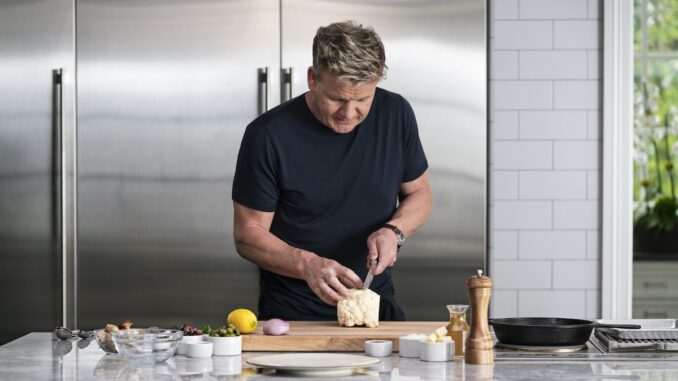
When Gordon Ramsay glides a knife through an onion at lightning speed, it’s like watching a master at work. Every cut is precise, clean, and confident — almost like choreography. For aspiring chefs and home cooks alike, it often seems like magic. But in a recent candid interview, Ramsay set the record straight: it’s not magic, and it’s not just the knife. The real secret? Relentless practice, respect for ingredients, and something most people overlook — rhythm.
Yes, Gordon Ramsay has world-class knife skills. Yes, he’s used some of the best blades in the world. But according to him, the true art of mastering knife work doesn’t start with the steel — it starts with the mindset. “The knife doesn’t do the work,” Ramsay explains. “You do. The knife is only as good as the hand that holds it.” And that hand, in Ramsay’s case, has held a knife for decades — through sweat, burns, failure, and triumph. His journey from a young apprentice to one of the world’s most respected chefs didn’t happen overnight. And neither did his slicing precision.
So how did he get there? How does someone become that fast, that controlled, that efficient? Ramsay says it began with repetition — “boring, exhausting repetition,” as he puts it. During his early years in professional kitchens, before he became a household name, Ramsay would spend hours — sometimes entire shifts — doing nothing but chopping. Onions, carrots, herbs, garlic. Again and again. Not for flair. Not for Instagram. But to get it right. To build muscle memory. To gain fluency in the language of cooking.
One of his earliest mentors taught him to treat every onion like it mattered. “If you rush, you bleed,” he recalls being told. “If you focus, you create.” That lesson stuck. Even now, Ramsay can often be found in his kitchen practicing cuts, even when he doesn’t have to. Because for him, cooking is not just a job — it’s a craft. And like any craft, it demands discipline.
But there’s more to it than just endless repetition. Ramsay believes that knife skills are closely tied to rhythm — to the flow of the body and the beat of the kitchen. “When you chop with rhythm, you stay in control. You’re not fighting the food. You’re dancing with it.” That’s why Ramsay often tells his students to listen to their own hands, to feel the movement rather than forcing it. Precision, he says, isn’t about going fast. It’s about going smoothly.
Another part of Ramsay’s secret? He never stops learning. Even now, after all the success, he watches other chefs. He studies their hands, their grip, their pace. “There’s always something to learn,” he says. “Some young chef somewhere is doing something I’ve never seen before. I watch, and I learn. Ego is the enemy of skill.” And then there’s the physical aspect. Ramsay trains like an athlete. He keeps his hands strong, his wrists flexible, his shoulders relaxed. Cooking for hours on end takes a toll on the body, and knife work in particular demands endurance. It’s not enough to know how to cut — your body has to keep up with that knowledge. That’s why Ramsay incorporates hand-strengthening exercises into his routine, and why he stresses posture and breath work to his students. “If you hold your knife with tension, you’ll lose your edge. Stay loose. Stay light. That’s where the finesse comes from.”
Of course, tools matter too. Ramsay uses high-quality knives and keeps them ruthlessly sharp. But he warns against over-relying on fancy equipment. “A good knife won’t fix bad habits,” he says. “And a dull mind is worse than a dull blade.” For beginners, he recommends starting with a single reliable chef’s knife and mastering that before moving on to others. “It’s not about owning ten knives. It’s about truly knowing one.” His advice for home cooks hoping to improve their own knife skills? Slow down. Practice mindfulness. Don’t aim to be fast — aim to be consistent. Ramsay suggests dedicating ten minutes a day to cutting practice. “Line up a row of carrots. Take your time. Watch your fingers. Listen to the sound the knife makes. Are your cuts even? Are you using the whole length of the blade? Those small things become big things.”
He also believes in connecting emotionally with food. “When you respect the ingredient, you handle it better. You don’t hack. You don’t rush. You honor it.” That respect, he says, shows in every slice. The cleaner the cut, the better the flavor, the more beautiful the plate. And while it might sound poetic, Ramsay insists it’s the difference between amateur and professional. In the end, Ramsay’s knife skills aren’t just about technique. They’re about philosophy. About showing up every day with the willingness to do the work — the boring, repetitive, unglamorous work — until it becomes second nature. “You don’t become good with a knife by watching YouTube,” he laughs. “You become good by doing. Over and over and over again.”
